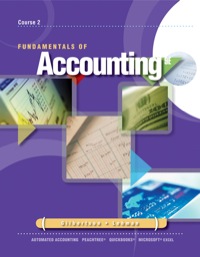Instructions The following transactions were completed by Irvine Company during the current fiscal year ended December 31: Feb. 8 May 27 Aug. 13 Oct. 31 Received 40% of the $18,000 balance owed by Decoy Co., a bankrupt business, and wrote off the remainder as uncollectible. Reinstated the account of Seth Nelsen, which had been written off in the preceding year as uncollectible. Joumalized the receipt of $7,350 cash in full payment of Seth's account Wrote off the $6,400 balance owed by Kat Tracks Co., which has no assets. Reinstated the account of Crawford Co., which had been written off in the preceding year as uncollectible. Journalized the receipt of $3,880 cash in full payment of the account. Wrote off the following accounts as uncollectible (compound entry): Newbauer Co., $7,190; Bonneville Co., $5,500; Crow Distributors, $9,400; Fiber Optics, $1,110. Based on an analysis of the $1,785,000 of accounts receivable, it was estimated that $35,700 will be uncollectible. Journalized the adjusting entry. Dec. 31 Dec. 31 1. Record the January 1 credit balance of $26,000 in a T-account for Allowance for Doubtful Accounts. 2. A. Journalize the transactions. Refer to the Chart of Accounts for exact wording of account titles. 3. Determine the expected net realizable value of the accounts receivable as of December 31 (after all of the adjustments and the adjusting entry) 4. Assuming that instead of basing the provision for uncollectible accounts on an analysis of receivables, the adjusting entry on December 31 had been based on an estimated expense of % of 1% of the net sales of $18,200,000 for the year, determine the following: A. Bad debt expense for the year. B. Balance in the allowance account after the adjustment of December 31 C. Expected net realizable value of the accounts receivable as of December 31 T-Accounts 1. Record the January 1 credit balance of $26,000 in a T-account for Allowance for Doubtful Accounts. 2. B. Post each entry that affects the following selected T-accounts and determine the new balances: Allowance for Doubtful Accounts and Bad Debt Expense Allowance for Doubtful Accounts Jan 1 Balance Dec. 31 Adj. Balance Bad Debt Expense Journal 2. A. Journalize the transactions. Refer to the Chart of Accounts for exact wording of account titles JOURNAL ACCOUNTIN DATE DESCRIPTION POST. REF. DEBIT CREDIT ASSETS LIABI 1 2 3 4 5 6 7 Journal 5 9 10 11 12 13 14 ST 16 17 10 19 20 Final Questions 3. Determine the expected net realizable value of the accounts receivable as of December 31 (after all of the adjustments and the adjusting entry). 4. Assuming that instead of basing the provision for uncollectible accounts on an analysis of receivables, the adjusting entry on December 31 had been based on an estimated expense of % of 1% of the net sales of $18,200,000 for the year, determine the following: A. Bad debt expense for the years B. Balance in the allowance account after the adjustment of December 31, $ C. Expected not realizable value of the accounts receivable as of December 31. $












